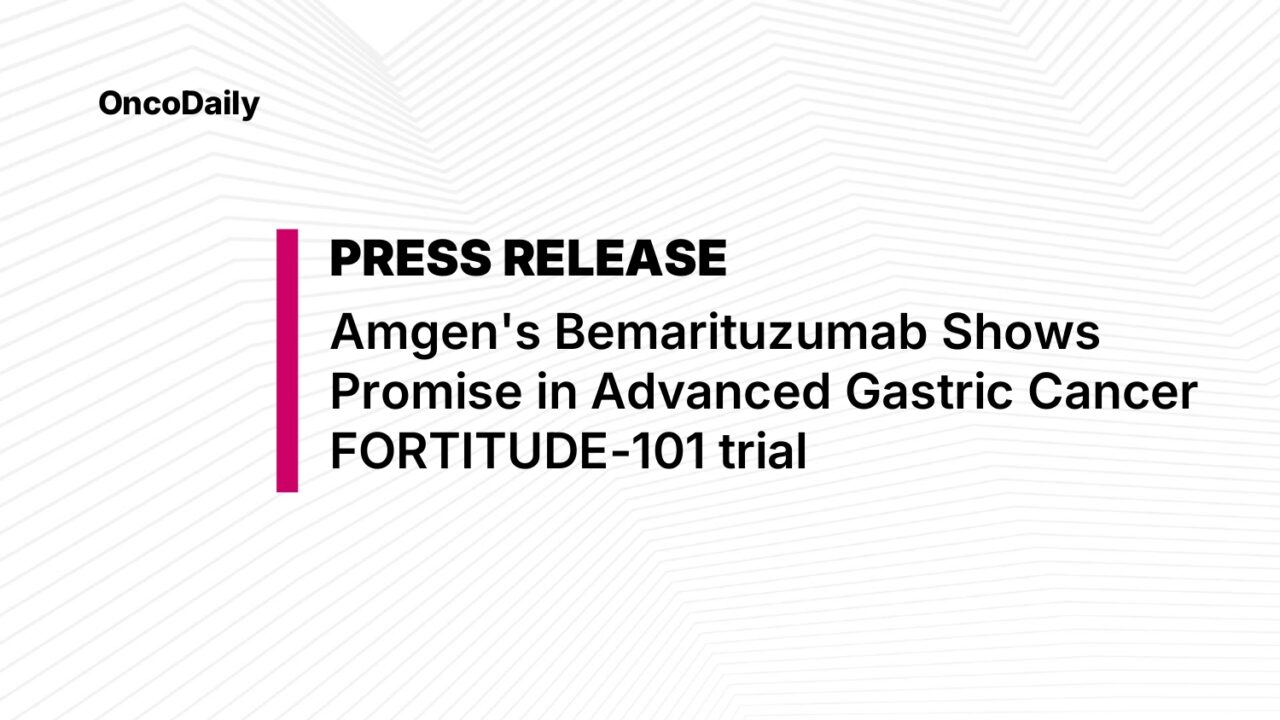Amgen has announced positive topline results from the Phase 3 FORTITUDE-101 trial, evaluating bemarituzumab in patients with first-line, FGFR2b-positive, unresectable, locally advanced, or metastatic gastric or gastroesophageal junction (G/GEJ) cancer. The results from this pivotal study, as revealed in a recent press release, demonstrate that the combination of bemarituzumab with standard chemotherapy (mFOLFOX6) significantly improved overall survival (OS) compared to chemotherapy alone. These findings highlight the potential of bemarituzumab as a novel targeted therapy for this challenging patient population. This article summarizes the key points from Amgen’s press release, offering a scientific overview of the study’s design, methodology, results, and implications for the future of gastric cancer treatment.

What drug is Bemarituzumab
Bemarituzumab is a monoclonal antibody that targets the fibroblast growth factor receptor 2b (FGFR2b), a receptor that is involved in the growth and spread of several cancers, including gastric and gastroesophageal junction (G/GEJ) cancers. Bemarituzumab is being developed by Amgen for the treatment of cancer, specifically targeting FGFR2b-positive tumors.
Bemarituzumab works by binding to FGFR2b, a cell surface receptor found to be overexpressed in various cancers, including some gastric and gastroesophageal cancers. FGFR2b is part of the fibroblast growth factor receptor family, which plays a critical role in tumor growth, angiogenesis (the formation of new blood vessels), and metastasis (spread of cancer cells to other parts of the body).
By binding to FGFR2b, bemarituzumab prevents the activation of downstream signaling pathways that are involved in cancer cell survival, proliferation, and migration. These pathways include the MAPK (Mitogen-Activated Protein Kinase) pathway and the PI3K/AKT (Phosphoinositide 3-kinase/Protein Kinase B) pathway. Inhibiting these pathways reduces tumor growth and spread
Bemarituzumab is designed to specifically target tumors that express FGFR2b, which helps in minimizing damage to normal tissues. This selective targeting can lead to a more focused anti-tumor effect, making the treatment potentially more effective and with fewer side effects compared to non-targeted therapies.
There is significant excitement among oncologists regarding the recent Phase 3 FORTITUDE-101 trial results, which have shown promising advances in the treatment of FGFR2b-positive gastric cancer. Jay Bradner, M.D., Executive Vice President of Research and Development at Amgen, highlighted the impact of these findings, stating, “Most patients with gastric cancer are diagnosed at an advanced stage, with poor prognosis, low survival rates, and limited therapeutic options. These first positive top-line results of an FGFR2b-targeted monoclonal antibody from our Phase 3 FORTITUDE-101 study mark a meaningful advance in the development of effective targeted therapy for gastric cancer.”
This sentiment is echoed by Sean S., Director of Business Development at Amgen, who shared his excitement about the trial’s success: “Amgen takes another step forward in the fight against gastric cancer! Phase 3 FORTITUDE-101 trial shows that bemarituzumab combined with chemotherapy significantly prolonged the overall survival of patients with FGFR2b-positive gastric cancer. This result brings new hope to patients!” These results bring a renewed sense of optimism to the oncology community, offering hope to patients with few effective treatment options.
Methods and Study Design
The Phase 3 FORTITUDE-101 trial was designed to assess the efficacy and safety of bemarituzumab in combination with mFOLFOX6 chemotherapy compared to placebo plus mFOLFOX6 in patients with first-line, unresectable, locally advanced, or metastatic G/GEJ cancer exhibiting FGFR2b overexpression. FGFR2b overexpression was defined as 2+/3+ staining intensity on ≥10% of tumor cells by centrally performed immunohistochemistry (IHC) testing. The primary endpoint was overall survival (OS), with key secondary endpoints including progression-free survival (PFS) and overall response rate (ORR). The trial enrolled 547 patients across 300 sites in 37 countries.
FORTITUDE-101 was a randomized, multi-center, double-blind, placebo-controlled Phase 3 study. Eligible patients were those with FGFR2b overexpression (≥10% 2+/3+ tumor cell staining) and without HER2 positivity. Participants were randomized to receive either bemarituzumab plus mFOLFOX6 or placebo plus mFOLFOX6. The study incorporated comprehensive ocular-related monitoring, a feature that distinguished it from previous bemarituzumab trials.
Results
At a pre-specified interim analysis, the combination of bemarituzumab and chemotherapy demonstrated a statistically significant and clinically meaningful improvement in OS compared to chemotherapy alone in the target patient population. Detailed results, including hazard ratios and confidence intervals, are anticipated to be presented at a future medical meeting. The safety profile observed in this trial was consistent with prior studies, with ocular adverse events such as reduced visual acuity, punctate keratitis, and corneal epithelium defects occurring more frequently and with greater severity in the bemarituzumab arm.
Key Findings
- Efficacy: Bemarituzumab plus chemotherapy significantly improved OS in patients with FGFR2b overexpression compared to chemotherapy alone.
- Safety: Ocular adverse events were more frequent and severe in the bemarituzumab arm, aligning with earlier Phase 2 findings.
- Biomarker Definition: FGFR2b overexpression was defined as 2+/3+ staining in ≥10% of tumor cells by IHC, a criterion that may aid in patient selection for future treatments.
Key Takeaway Messages
- Targeted Therapy: Bemarituzumab represents a novel targeted therapeutic approach for patients with FGFR2b-positive advanced G/GEJ cancer.
- Patient Selection: Accurate biomarker testing for FGFR2b overexpression is crucial for identifying patients who are most likely to benefit from bemarituzumab therapy.
- Safety Monitoring: Enhanced ocular monitoring is recommended for patients receiving bemarituzumab due to the increased incidence of ocular adverse events.
- Regulatory Implications: These positive interim results may support regulatory submissions and potential approval of bemarituzumab in this indication.
Conclusion
The Phase 3 FORTITUDE-101 trial’s positive interim results mark a significant advancement in the treatment of FGFR2b-positive advanced gastric cancer. The combination of bemarituzumab and chemotherapy has demonstrated a meaningful improvement in overall survival, offering new hope for patients with limited treatment options. Ongoing safety monitoring and biomarker-driven patient selection will be essential to optimize the therapeutic benefit of bemarituzumab. As detailed results are presented in upcoming medical forums, the oncology community anticipates further insights into the role of FGFR2b-targeted therapies in gastric cancer management.
You can read the full article here.


